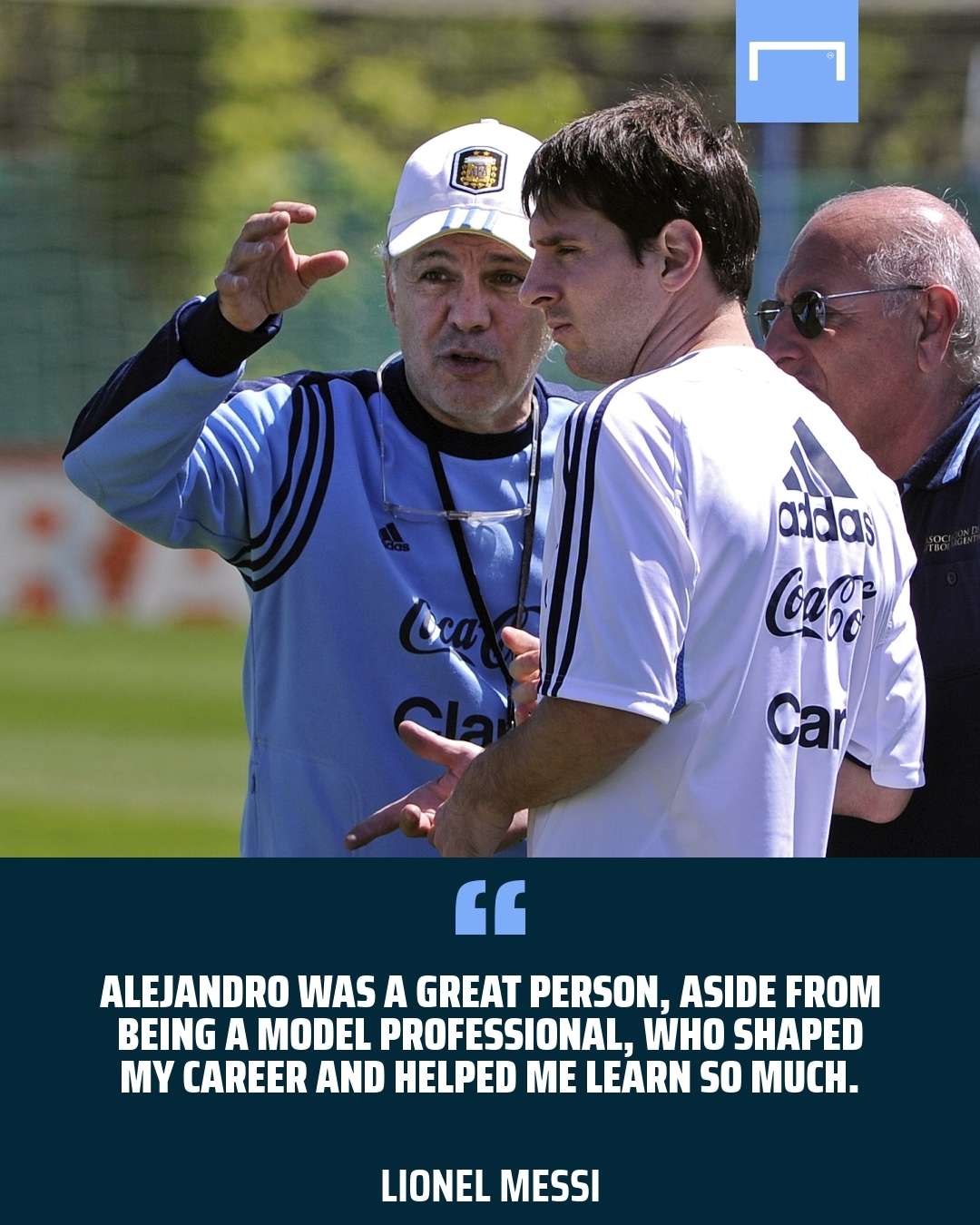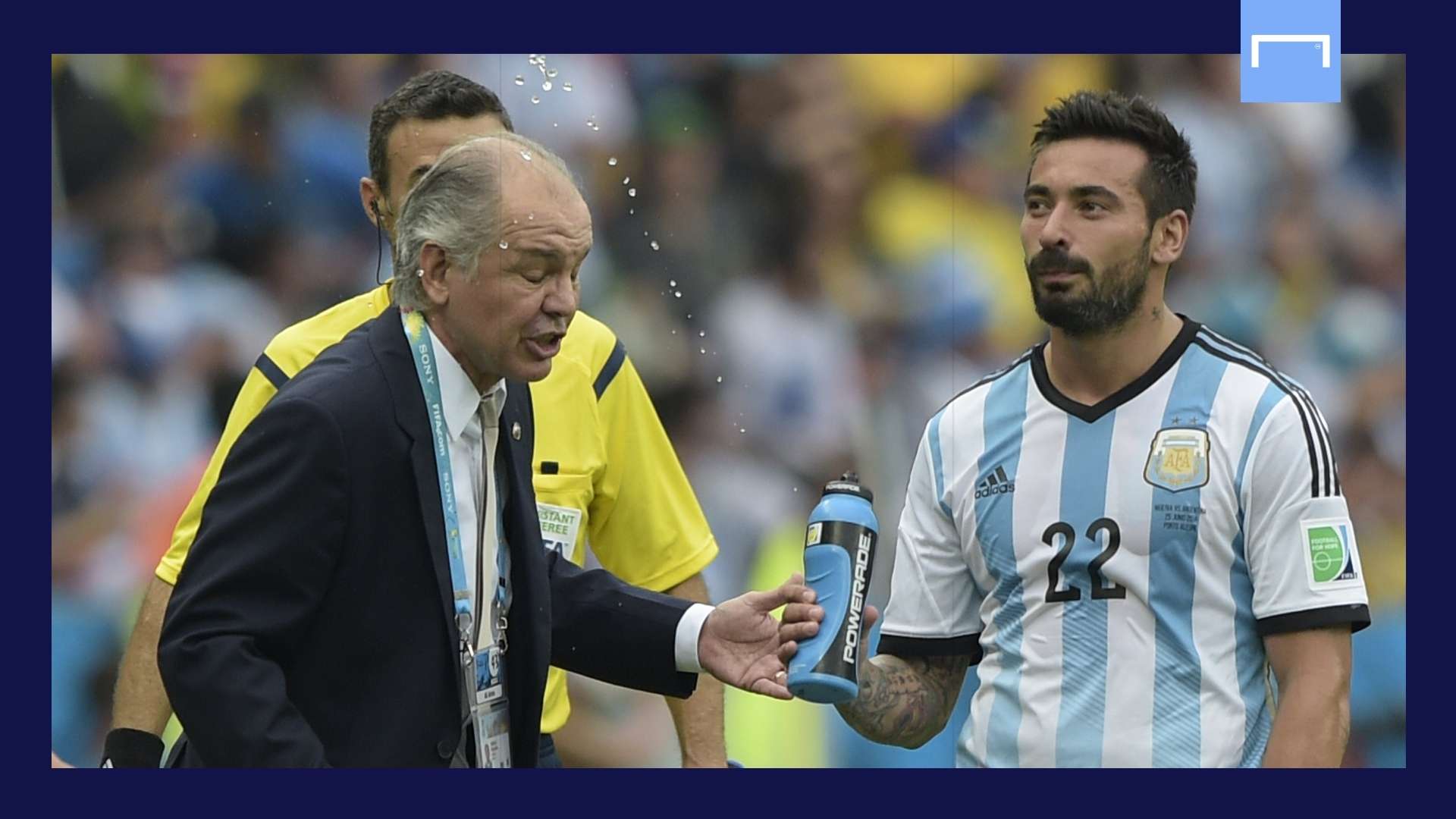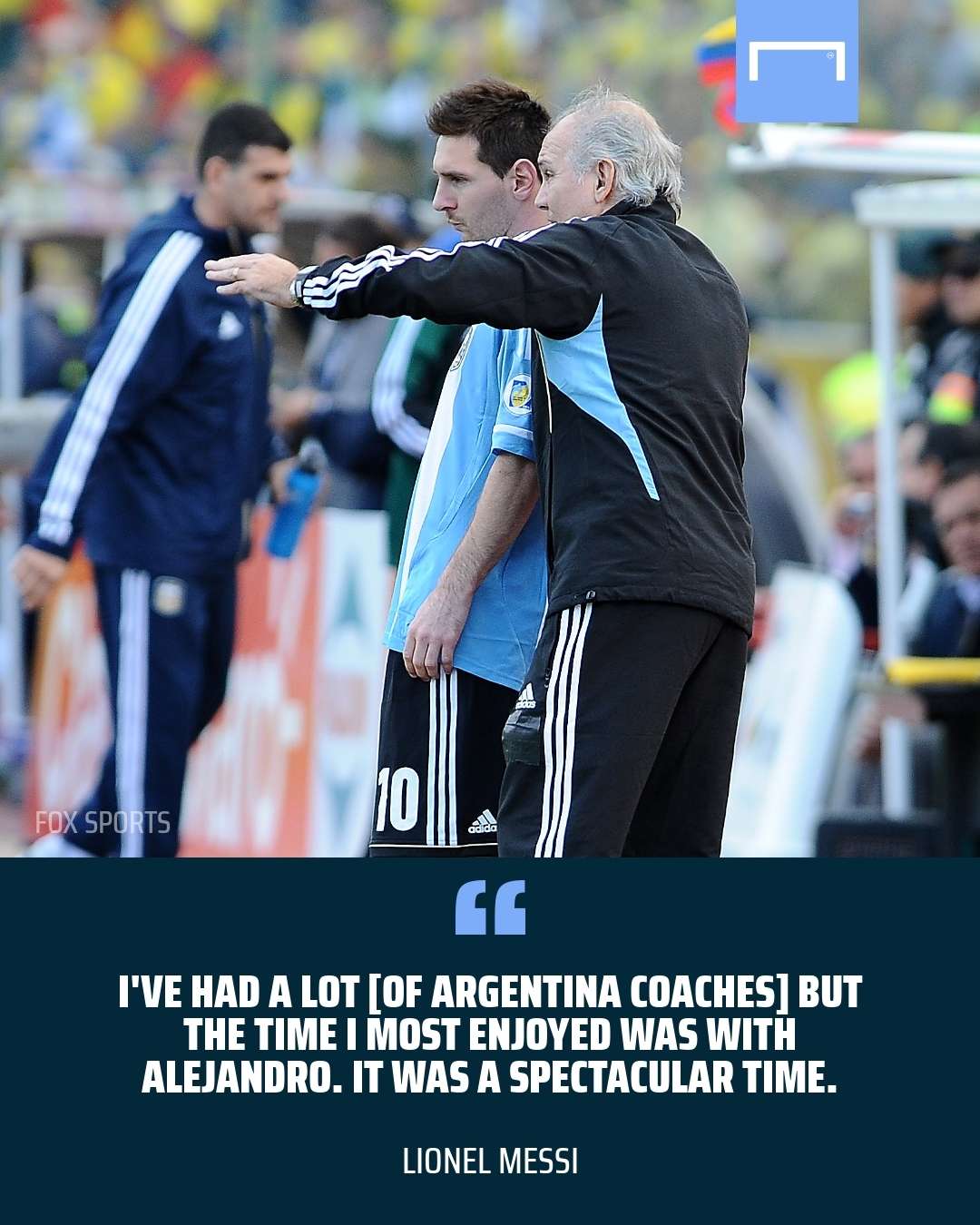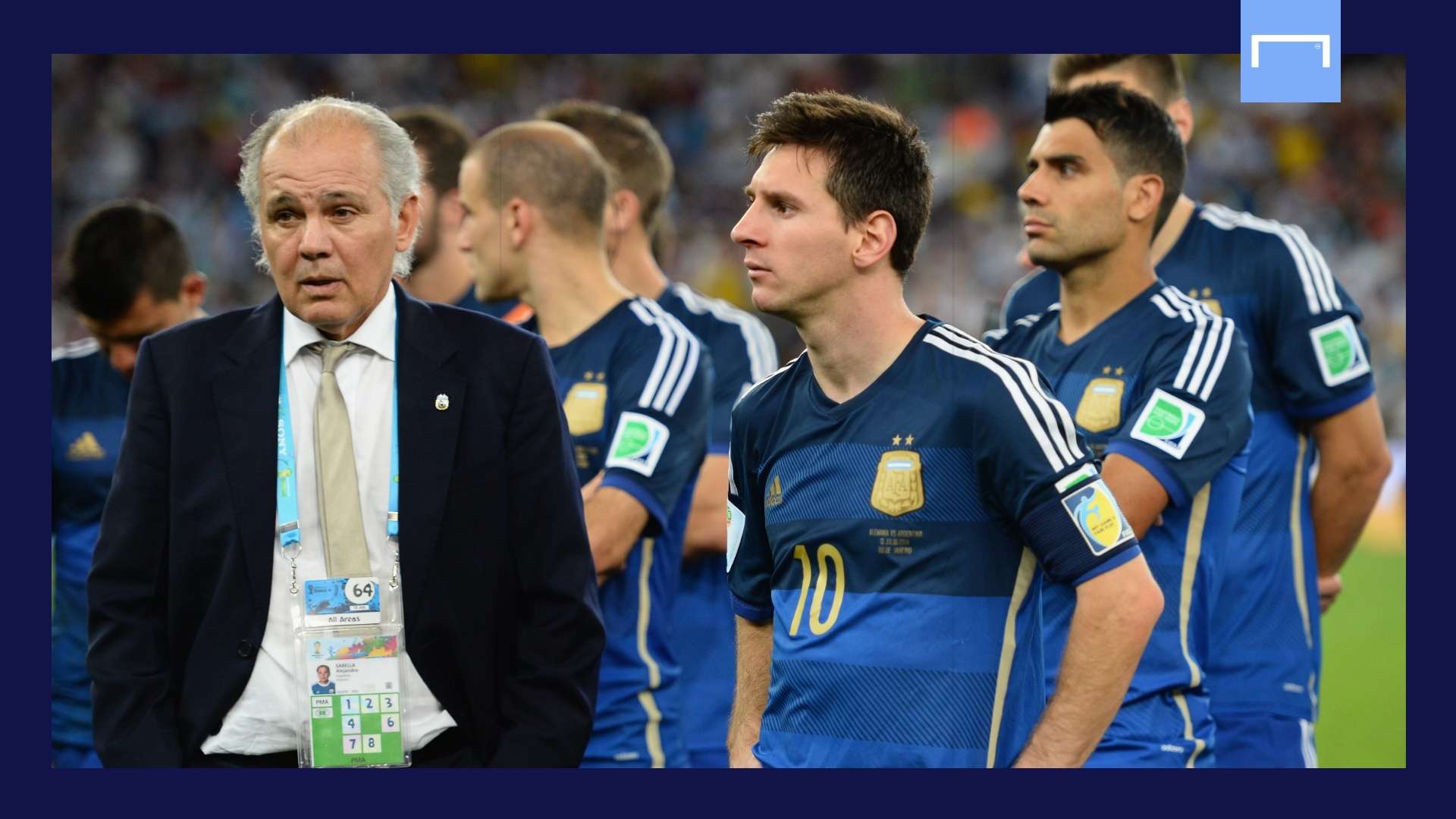The world of Argentine football had not finished grieving for its favourite son when, on Tuesday afternoon, news of another painful loss began to circulate.
He may not have been recognised with quite the same fervour worldwide as one of his predecessors in the Argentina job, Diego Maradona, but inside the sport, and in his native Argentina in particular, the unassuming former Estudiantes and Albiceleste boss was revered for his work on the field as a player and a coach, and off the field as one of football's most genuine, decent personalities.
In the last 30 years, moreover, he came closer than anyone to winning the World Cup for the Albiceleste – and, perhaps most importantly, very nearly solved the intractable riddle of how to get the best out of Lionel Messi in international colours.
Messi, who was preparing for what turned out to be a humiliating home defeat at the hands of Juventus when Sabella's passing was confirmed, offered a glowing tribute to his former mentor.
"It was a pleasure to share so much with you," the star said on Instagram. "Alejandro was a great person, aside from being a model professional, who shaped my career and helped me learn much from him.
"We enjoyed together some of my favourite footballing memories during qualification for the World Cup and in the World Cup itself. My condolences to all his family and friends."
Those sentiments were echoed by other veterans of Argentina's gripping ride to the 2014 World Cup final in Brazil, such as Sergio Aguero, Javier Mascherano and Ezequiel Lavezzi, who famously squirted water in his bemused coach's face while receiving a series of frenetic tactical instructions.
 Getty/Goal
Getty/Goal
Unlike how many of his predecessors or successors would have reacted, Sabella laughed off Pocho's impertinence, and the situation summed up the close-knit, relaxed, ego-free atmosphere that formed such a key part of the Albiceleste's campaign six years ago. And it was typical of a man who always appeared to act with others' interests at heart, a trait which made him a national treasure.
Maradona, Carlos Bilardo, Marcelo Bielsa, Cesar Menotti: most of Argentine football's most beloved figures have been huge, at times over-bearing characters.
Sabella, though, was cut from a different cloth. Like Bielsa, he grew up in a comfortably upper-middle class home, and won a place to study law at the University of Buenos Aires as a youth before finally opting to focus on football over his studies.
That decision was not taken in vein, as the midfielder – blessed with stunning technique, but so one-paced he earned the nickname 'Pachorra' (Sloth) – began to break through the ranks at River Plate.
The presence of club legend Norberto 'Beto' Alonso restricted his first-team appearances, but Sabella nevertheless contributed to three title wins during his time at the Monumental before seeking new pastures after the 1978 World Cup.
His choice of destination once more broke the mould. Sheffield United, in the old English Second Division, had originally set their sights on the 17-year-old Maradona, only to become exasperated by the spiralling transfer demands of Argentinos Juniors. Coach Harry Haslam, in Argentina to watch the World Cup, began to look around for an alternative, and eventually settled on Pachorra.
 Getty/Goal
Getty/Goal
Sabella's languid style may not have been tailor-made for the frenzied rough and tumble of the second tier, but he stayed two years at Bramall Lane and made over 70 appearances before leaving due to the Blades' relegation to the Third Division. He remains a cult hero at the club, albeit less so at next employer Leeds United, for whom he played just a handful of games before returning to his soon-to-be spiritual home, Estudiantes.
As a player and later as coach, where he won the 2009 Copa Libertadores and came agonisingly close to upsetting Messi's Barca in that year's Club World Cup, Sabella joined the likes of Bilardo, Osvaldo Zubeldia and Veron senior and junior, Juan Ramon and son Juan Sebastian, in the Estudiantes pantheon of idols.
When Sergio Batista, Maradona's ill-fated replacement at Argentina, was sacked after just a year in charge following the nation's 2011 Copa America disappointment, Pachorra, who formed part of the 1998 World Cup team as Daniel Passarella's No. 2, was the logical and indeed ideal candidate.
“I've had a lot [of national team coaches], but the time I most enjoyed was with Alejandro,” Messi remarked to Fox Sports back in March.
“In the qualifiers we started poorly but once we started to win, it was a spectacular time. It was the spell I most enjoyed with the national team and Alejandro was phenomenonal both as a coach and as a person.”
 Getty/Goal
Getty/Goal
It was Sabella who made the decision to entrust the withdrawn, timid Messi with the captain's armband, instilling in the Barca star a new responsibility when it came to the Albiceleste.
More importantly, he recognised that without the necessary support on the pitch, Leo would never hit the same heights as in Camp Nou. Aguero and Gonzalo Higuain joined the No.10 in a deadly attacking trident, while Angel Di Maria roamed down the left in a role that meant Argentina effectively played in a 4-2-4 system when in possession.
There were curious moments along the way, such as the switch to a five-man defence to kick off the World Cup against Bosnia & Herzegovina – quietly dropped at half-time and never repeated – but the overall sensation was overwhelmingly positive.
Argentina qualified with ease at the top of the CONMEBOL standings, with Messi, Higuain and Aguero netting a combined total of 24 goals and Di Maria pitching in with another three.
Kun's fragile fitness levels in the finals themselves, the later injury to Di Maria and the need to protect the side's ever-rickety defence meant the Albiceleste were never able to cut loose in the same fashion in Brazil.
However, the brilliant team spirit fostered by Sabella, backed up by tens, perhaps even hundreds of thousands of supporters who had travelled north to cheer their heroes on, drove them on to the final where, if Higuain or Rodrigo Palacio or even Messi himself had been just been a little more ruthless in front of goal, they could well have gone on to lift the trophy long before Mario Gotze had the chance to write himself into the history books for Germany.
 Getty/Goal
Getty/Goal
Sabella had already decided before the final that he would step down from his post after the World Cup, and following a heroes' welcome back in Buenos Aires he settled into a quiet retirement, never again accepting a position in coaching.
The flood of tributes the late coach has received in the past 48 hours speak of his wisdom and love of the game, but also of his generosity of spirit and iron-clad convictions.
In 2013, for example, during the horrendous La Plata floods which left at least 89 dead and thousands homeless, Sabella put to one side his national team duties and opened his home in the city to victims, providing shelter and food for affected families.
He was also a relentless political campaigner for the causes closest to his heart, working closely for years with the Grandmothers of the Plaza de Mayo group, which for 40 years has sought to reunite the children taken from their 'disappeared' mothers by the military dictatorship and given up in adoption with their biological families; and La Garganta Poderosa, a magazine and activist group that represents the nation's vulnerable shanty town residents. “Thank you, Sabella,” La Poderosa wrote in tribute on Twitter.
“For visiting our neighbourhoods, for yelling for us right before the World Cup, for giving us joy, hearing our demands, for embracing our causes so tightly, for always playing in favour of the people and never for the stands, your marks will not be erased. Thank you for everything, Pachorra!”
Sabella will be remembered for his decency, his humility and his ability to inspire Messi and his team-mates when it most counted. His greatest legacy, though, will be that unforgettable month in Brazil, when he and his Albiceleste troops briefly united a deeply fractured nation amid the euphoria of their brush with World Cup glory.
